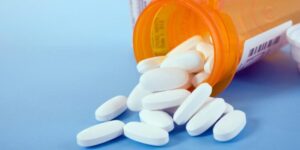Is Too Much Medicine Making Us Sick?
Mon 9:16 am +01:00, 24 Oct 2022 1
Thérèse Coffey, the new Health Secretary, was accused of “monumental stupidity” recently for giving leftover antibiotics to a friend. Doctors rounded on her as they described her actions as both dangerous and against the law. Medical professionals fear the public might think it safe and lawful to share unused medicines. This news came amid reports of plans to allow pharmacies to prescribe antibiotics without patients first being examined by their GPs. U.K. pharmacies will be allowed to manage and supply more medicines including contraception without a doctor’s prescription under the plans to overhaul the creaking National Health Service. It comes after complaints from the public about a lack of face-to-face GP appointments since the Covid restrictions began.
This story appears to be a further example of our Government’s Covid policy mindset, where the public are merely fodder for mass experimentation and where the politicians are absolved of any of the possible dire consequences. The harms of over-prescribing antibiotics and medicines may have been underestimated in the Government’s Covid strategy.
An example of the mindset described above is the manner in which dental access was restricted during lockdown. An ‘AAA’ approach of advice, analgesics (painkillers) and antibiotics was instigated. A CQC report highlights some of the problems: there was already a serious access issue before Covid and the response to it resulted in further reduced capacity; there were more negative feedback accounts of patients searching for dentists many miles away, reeling in pain and even attempting to remove their own teeth with pliers; antibiotic prescribing increased by over 25% and in some areas such as London by 60%, according to a recent study in the British Dental Journal; patients were asked to attend alone and be masked; there were problems with dental services not being able to work well with other health and care providers and difficulties that prevented patients from receiving a prompt, joined-up experience of care.
It is very difficult to know just how many extra painkillers were taken over the period of Covid restrictions for both dental and general medical reasons because many may have been taken without prescription. But the number is sure to have increased significantly and one should not underestimate the adverse consequences and increased risk this may have posed, especially to the aged, ill or medically compromised. Paracetamol prescriptions increased by 22% and a study showed that opioid use increased by 40% for those patients waiting for hip and knee replacements. The waiting list for orthopaedic operations has since deteriorated further. When opioids are used like this patients are more at risk of complications related to the operation, poorer outcomes and ongoing opioid dependence.
The reports of increased use of the powerful sedative midazolam during the early phase of Covid is shocking and demands a thorough investigation.
The harms of over-prescribing antibiotics and medicines in general can also be compared to the effect of the Government’s Covid strategy on society. Delicate pre-existing equilibriums – both social and physiological – were bombarded by outside influences with consequences that, for most, were far more harmful than Covid itself.
Antibiotic over-prescribing can result in some of the following possible consequences:
- antibiotic associated diarrhoea;
- clostridium difficile infection;
- helicobacter pylori infection;
- development of obesity, autism, allergies and inflammatory bowel disease and delayed gut flora development in children.
The first three of the above effects can be catastrophic for the elderly, hospitalised and medically compromised, for whom Covid policy was meant to help most. There was a large rise in the prescribing of certain medications including antibiotics in nursing homes during Covid. Interestingly, another study of general primary care antibiotic prescribing showed an overall decrease in the eight month period following the start of the initial lockdown but the prescribing of broad-spectrum antibiotics increased – especially in older patients.
The effects included in the last item of the above list can adversely affect the health of children, for whom Covid poses little, if any, threat.
A 2019 study in Nature showed the staggering death toll of bacterial antimicrobial resistance that kills more than HIV/AIDS or malaria. A 2016 review estimated that, by 2050, there could be 10 million such deaths per year globally and that some infections may become incurable.
The potentially harmful effects of antibiotics on our natural gut flora include a reduced diversity of species, altered metabolic activity and an increased proportion of antibiotic-resistant organisms. Many people may be unaware that as much as 70-80% of the immune cells in our bodies are present in the gut. They help filter nutrients, prevent toxins entering the bloodstream and also strengthen and support systemic immunity.
Dr. Wendy Thompson, author of the British Dental Journal study mentioned above, said: “Antibiotics are life-saving drugs; when people need them, they really need to work.”
With the NHS waiting list for hospital treatment now hitting a record high at 7 million, almost half a million patients waiting more than a year and with 12% fewer operations and treatments than before Covid, will the legacy of the Government’s lockdowns be increased morbidity and excess mortality compounded by more prescribing? Will another legacy of Covid policy and its increased antibiotic, painkiller and, of course, vaccine prescribing regime be that the pharmaceutical industry is the big winner and the rest of us are the losers, made sick by unnecessary medicine?
Dr. Mark Shaw is a retired dentist.



When someone tells me they’re taking antibiotics that have been properly prescribed I always ask if they’re taking pro-biotics as well. They look stunned when I tell them that a responsible doctor should prescribe them automatically as antibiotics alone can really damage the microbiome.
There is a lot to be gained by doing some basic research.